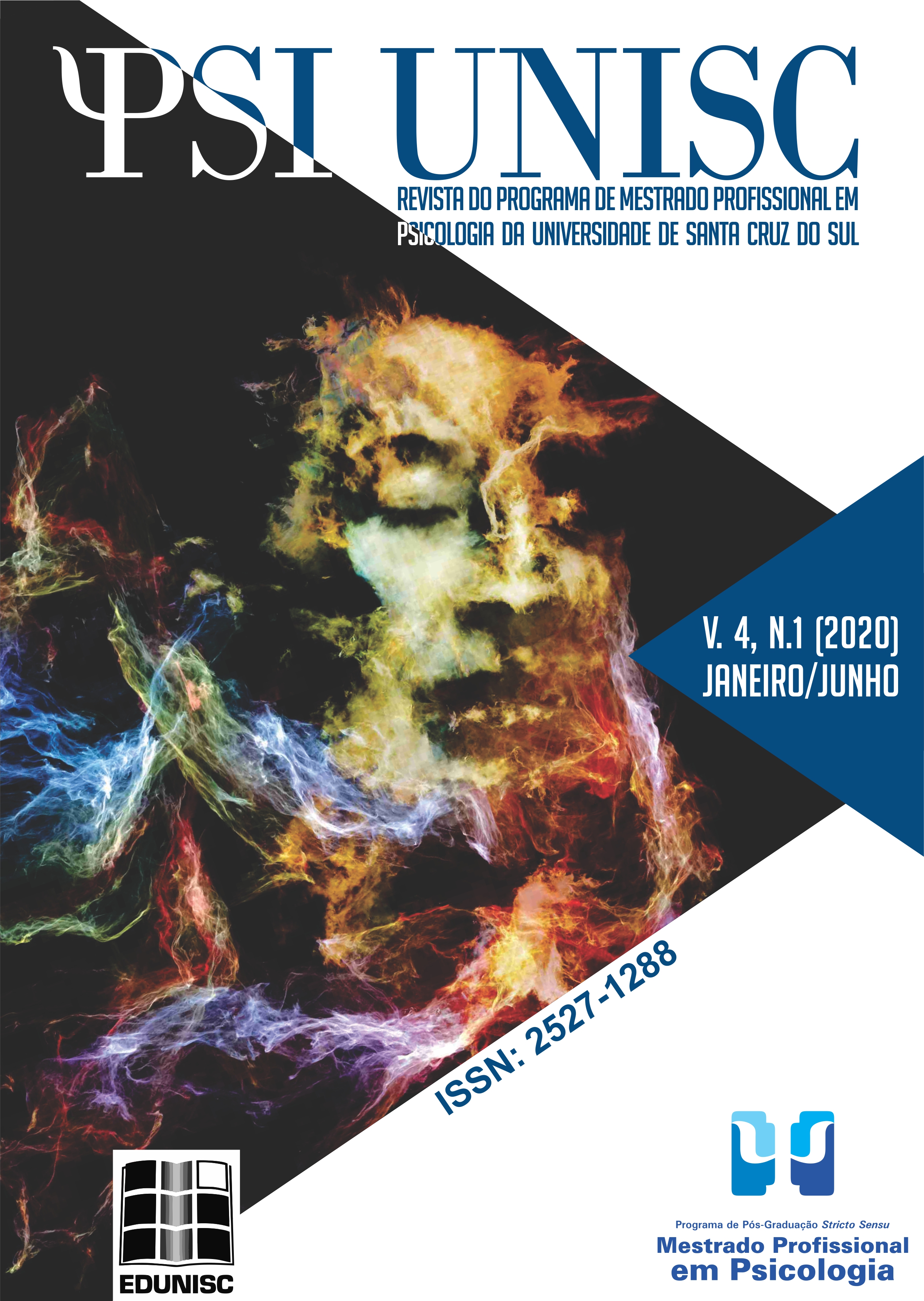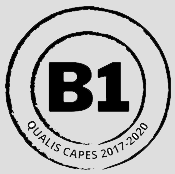Institutional Intervention in Youth and Adult Education: an Experience Report
DOI:
https://doi.org/10.17058/psiunisc.v4i1.13532Keywords:
Youth and adult education, Institutional Psychology, Institutional overtime.Abstract
The present work is an experience report, developed from an extension project carried out with a group of ten coordinators of Youth and Adult Education (EJA) in a municipality of the metropolitan region of Florianópolis (SC-Brazil), during the years 2016 and 2017. It was referenced in authors such as Lourau (1995; 2004), Lapassade (1983), Guirado (2004) and Machado and Sayão (2017). The intervention had as methodological device the Institutional Service (Plantão Institucional) (Lerner, Fonseca & Machado, 2014). It was held on a team meeting day with the Nucleus coordinators and was held once a month, with about three or four meetings per semester. The number of meetings varied due to the demands and specific situations that occurred during the course of the work. The activities were carried out at the Psychological Attention Service of the Federal University of Santa Catarina (SAPSI) and lasted from one hour and a half to two hours and had an average of six to eight coordinators per meeting. The results identified that the coordinators placed themselves in a place of protagonism in relation to the EJA as a pedagogical and formative device, being taken as responsible for the implementation and accomplishment of its objectives. They encountered, however, many times with organizational and pedagogical difficulties while carrying out the work. Overproduction emerged as a resource to deal with these difficulties, through engagement and militancy.The present work is an experience report, developed from an extension project carried out with a group of ten coordinators of Youth and Adult Education (EJA) in a municipality of the metropolitan region of Florianópolis (SC-Brazil), during the years 2016 and 2017. It was referenced in authors such as Lourau (1995; 2004), Lapassade (1983), Guirado (2004) and Machado and Sayão (2017). The intervention had as methodological device the Institutional Service (Plantão Institucional) (Lerner, Fonseca & Machado, 2014). It was held on a team meeting day with the Nucleus coordinators and was held once a month, with about three or four meetings per semester. The number of meetings varied due to the demands and specific situations that occurred during the course of the work. The activities were carried out at the Psychological Attention Service of the Federal University of Santa Catarina (SAPSI) and lasted from one hour and a half to two hours and had an average of six to eight coordinators per meeting. The results identified that the coordinators placed themselves in a place of protagonism in relation to the EJA as a pedagogical and formative device, being taken as responsible for the implementation and accomplishment of its objectives. They encountered, however, many times with organizational and pedagogical difficulties while carrying out the work. Overproduction emerged as a resource to deal with these difficulties, through engagement and militancy.Downloads
References
Baremblitt, G. (1994). Compêndio de Análise Institucional e outras correntes. Rio de Janeiro: Rosa dos Tempos.
Berger, D. (2013). Trajetórias Territoriais dos Jovens da EJA. Congresso de Educação Básica, (pp. 1-11). Florianópolis.
Bleger, J. (1984). Psico-Higiene e Psicologia Institucional. Porto Alegre: Artmed.
Brasil. (2005). Lei de Diretrizes e Bases. Brasília: Ministério da Educação.
Deleuze, G. & Guattari, F. (2011). O Anti-Édipo. Capitalismo e esquizofrenia (2a ed.). São Paulo: Editora 34.
Gallo, S. (2003). Deleuze & Educação. Belo Horizonte: Autêntica.
Guirado, M. (2004). Psicologia Institucional. São Paulo: EPU.
Lapassade, G. (1983). Grupos, organizações e instituições. Rio de Janeiro: Francisco Alves.
Lerner, A., Fonseca, P. S., & Machado, A. (2014). Plantão institucional: uma modalidade de intervenção face ao mal-estar contemporâneo na educação. Estilos da Clínica, 19, 199-208. Recuperado de http://pepsic.bvsalud.org/scielo.php?script=sci_arttext&pid=S1415-71282014000100013&lng=pt&tlng=pt
Lourau, R. (1995). A análise institucional. Petrópolis: Vozes.
Lourau, R. (2004). René Lourau. Analista institucional em tempo integral. São Paulo: HUCTEC.
Machado, A.; & Sayão, Y. (2017). Plantão institucional em tempos difíceis: uma prática psi no campo da educação. In A. M. Machado, A. B. C. Lerner, & P. F. Fonseca (Orgs.), Concepções e proposições em Psicologia e Educação (pp. 159-172). São Paulo, SP: Blucher.
Naujorks, C. & Silva, M. (2016). Correspondência identitária e engajamento militante. Civitas, 16(1), 136-152. doi: 10.15448/1984-7289.2016.1.18139
Oliveira, G. M. (2008). A pesquisa como princípio educativo: construção coletiva de um modelo de trabalho. Estrutura, Funcionamento, Fundamentação e Prática na Educação de Jovens e Adultos (pp. 37-43). Florianópolis: Prefeitura Municipal de Florianópolis.
Paulon, S. M. (2005). A análise de implicação com ferramenta na pesquisa-intervenção. Psicologia & Sociedade, 17(3), 18-25. doi: 10.1590/S0102-71822005000300003
Pierro, M. C., Jóia, O., & Ribeiro, V. M. (2001). Visões da educação de jovens e adultos no Brasil. Cadernos CEDES, 21(55), 58-77. doi: 10.1590/S0101-32622001000300005
Rodrigues, G. T., Agostinho, S. C., Gesser, M., & Oltramari, L. C. (2014). Psicologia e educação de jovens e adultos: um desafio em construção. Psicologia Escolar e Educacional, 18(1), 181-184. doi: 10.1590/S1413-85572014000100020
Romagnoli, R. (2014). O conceito de implicação e a pesquisa-intervenção institucionalista. Psicologia & Sociedade, 26(1), 44-52. doi: 10.1590/S0102-71822014000100006
Rossi, A., & Passos, E. (2014). Análise Institucional: revisão conceitual e nuances da pesquisa-intervenção do Brasil. Revista Epos, 5(1), 156-181. Recuperado de http://pepsic.bvsalud.org/scielo.php?script=sci_arttext&pid=S2178-700X2014000100009&lng=pt&tlng=pt
Rummert, S. M. (2007). A educação de jovens e adultos trabalhadores brasileiros no século XXI: O “novo” que reitera antiga destituição de direitos. Sísifo/Revista de ciências da educação (2), 29-45. Recuperado de http://forumeja.org.br/sites/forumeja.org.br/files/sisifo0203_rummert.pdf
Rummert, S. M., & Ventura, J. P. (2007). Políticas públicas para educação de jovens e adultos no Brasil: a permanente (re)construção da subalternidade - considerações sobre os Programas Brasil Alfabetizado e Fazendo Escola. Educar em Revista, (29), 29-45. doi: 10.1590/S0104-40602007000100004
Soares, L. J., & Pedroso, A. P. (2016). Formação de educadores na educação de jovens e adultos (EJA): alinhavando contextos e tecendo possibilidades. Educação em Revista, 32(4), 251-268. doi: 10.1590/0102-4698161277
Théret, B. (2003). As instituições entre as estruturas e as ações. Lua Nova: Revista de Cultura e Política, (58), 225-254. doi: 10.1590/S0102-64452003000100011
Downloads
Published
How to Cite
Issue
Section
License
The submission of originals to this journal implies the transfer, by the authors, of the printed and digital publication rights. The copyrights for the published articles are those of the author, with periodical rights on the first publication. Authors may only use the same results in other publications clearly indicating this journal as the medium of the original publication. Because we are an open access journal, we allow free use of articles in educational and scientific applications provided the source is cited under the Creative Commons CC-BY license.




